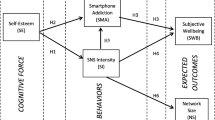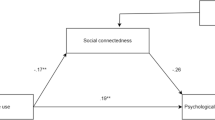Abstract
Social skills play a pivotal role in fabricating and consolidating social relationships. Presently, smartphones have completely changed the mode of social communication. Individuals equipped with adequate social skills may use smartphones for diverse purposes ranging from social needs and hedonic needs to cognitive needs. Despite having many advantages, smartphones also serve as a source of immediate gratification and may make individuals vulnerable to addiction to their smartphones with several consequences for their well-being. The study attempts to establish a model for analyzing the mediating effect that smartphone addiction may have on the relationship between social skills and psychological well-being. A sample of 509 adult participants from the capital and national capital region, India, responded to questionnaires related to social skills, smartphone addiction, and psychological well-being. Data retrieved from this phase was analyzed using PROCESS macro [7]. The mediation analysis yielded the following results: (I) Two dimensions of social skills, namely social expressivity, and emotional control, significantly predicted dimensions of smartphone addiction and psychological well-being. (II) Two dimensions of smartphone addiction- uncontrolled usage and cyberspace orientation, showed the full mediating effect on the relationship between social skills and psychological well-being. (III) Social expressivity positively influenced smartphone addiction (uncontrolled usage and cyberspace orientation), leading to diminished psychological well-being. (IV) On the contrary, emotional control curbed the tendency for smartphone addiction, resulting in better psychological well-being. The present study has many important implications for both researchers as well as to common masses. An effective intervention program based on emotional regulation and emotional control will help control the disadvantages of smartphone addiction, which will also help achieve greater psychological well-being levels.
Access this chapter
Tax calculation will be finalised at checkout
Purchases are for personal use only
Similar content being viewed by others
References
Agarwal, R., Karahanna, E.: Time flies when you’re having fun: cognitive absorption and beliefs about information technology usage. MIS quarterly 665–694 (2000)
Al-Barashdi, H.S., Bouazza, A., Jabur, N.H.: Smartphone addiction among university undergraduates: a literature review. J. Sci. Res. Reports 210–225 (2015)
Billieux, J., Maurage, P., Lopez-Fernandez, O., Kuss, D.J., Griffiths, M.D.: Can disordered mobile phone use be considered a behavioral addiction? An update on current evidence and a comprehensive model for future research. Curr. Addic. Reports 2(2), 156–162 (2015)
Chan, M.: Mobile-mediated multimodal communications, relationship quality and subjective well-being: an analysis of smartphone use from a life course perspective. Comput. Hum. Behav. 87, 254–262 (2018)
Csikszentmihalyi, M.: Beyond boredom and anxiety. Jossey-Bass (2000)
Daraee, M., Salehi, K., Fakhr, M.: Comparison of social skills between students in ordinary and talented schools. In: Selection & Peer-review under responsibility of the Conference Organization Committee, pp. 513–521. European: ICEEPSY. vol. 2016, p. 7th (2016)
Hayes, A.F.: PROCESS: A versatile computational tool for observed variable mediation, moderation, and conditional process modeling (2012)
Hong, F.Y., Chiu, S.I., Huang, D.H.: A model of the relationship between psychological characteristics, mobile phone addiction and use of mobile phones by Taiwanese university female students. Comput. Hum. Behav. 28(6), 2152–2159 (2012)
Horwood, S., Anglim, J.: Problematic smartphone usage and subjective and psychological well-being. Comput. Hum. Behav. 97, 44–50 (2019)
Kelly, T.H., Bardo, M.T.: Emotion regulation and drug abuse: implications for prevention and treatment (2016)
Kwon, M., et al.: Development and validation of a smartphone addiction scale (SAS). PloS one 8(2), e56936 (2013)
Lin, Y.H., Chang, L.R., Lee, Y.H., Tseng, H.W., Kuo, T.B., Chen, S.H.: Development and validation of the smartphone addiction inventory (spai). PloS one 9(6), e98312 (2014)
Munderia, R., Singh, R.: The relationship between social skills and percived smartphone usage. J. Psychosocial Res. 14(1) (2019)
Munderia, R., Singh, R.: Mobile phone dependence and psychological well-being among young adults. Indian J. Community Psychol. 14(2), 321 (2018)
Nangle, D.W., Hansen, D.J., Erdley, C.A., Norton, P.J.: Practitioner’s Guide to Empirically based Measures of Social Skills. Springer Science & Business Media (2009)
Norton, P.J., Hope, D.A.: Analogue observational methods in the assessment of social functioning in adults. Psychol. Assess. 13(1), 59 (2001)
Riggio, R.E.: Assessment of basic social skills. J. Pers. Soc. Psychol. 51(3), 649 (1986)
Ryan, R.M., Deci, E.L.: On happiness and human potentials: a review of research on hedonic and eudaimonic well-being. Ann. Rev. Psychol. 52(1), 141–166 (2001)
Ryff, C.D., Singer, B.: The contours of positive human health. Psychol. Inquiry 9(1), 1–28 (1998)
Segrin, C., Hanzal, A., Donnerstein, C., Taylor, M., Domschke, T.J.: Social skills, psychological well-being, and the mediating role of perceived stress. Anxiety, Stress, Coping 20(3), 321–329 (2007)
Spada, M.M., Marino, C.: Metacognitions and emotion regulation as predictors of problematic internet use in adolescents. Clin. Neuropsychiatry 14(1), 59–63 (2017)
Turel, O., Serenko, A.: The benefits and dangers of enjoyment with social networking websites. Eur. J. Inf. Syst. 21(5), 512–528 (2012)
Van Deursen, A.J., Bolle, C.L., Hegner, S.M., Kommers, P.A.: Modeling habitual and addictive smartphone behavior: the role of smartphone usage types, emotional intelligence, social stress, self-regulation, age, and gender. Comput. Human Behav. 45, 411–420 (2015)
Yang, Z., Asbury, K., Griffiths, M.D.: An exploration of problematic smartphone use among Chinese university students: associations with academic anxiety, academic procrastination, self-regulation and subjective wellbeing. Int. J. Mental Health Addict. 17(3), 596–614 (2019)
Yu, J.J., Kim, H., Hay, I.: Understanding adolescents’ problematic Internet use from a social/cognitive and addiction research framework. Comput. Human Behav. 29(6), 2682–2689 (2013)
Zhang, K., Chen, C., Zhao, S., Lee, M.: Compulsive smartphone use: the roles of flow, reinforcement motives, and convenience. In: 35th International Conference on Information Systems: Building a Better World Through Information Systems, (ICIS) (2014)
Author information
Authors and Affiliations
Corresponding author
Editor information
Editors and Affiliations
Rights and permissions
Copyright information
© 2021 Springer Nature Switzerland AG
About this paper
Cite this paper
Munderia, R., Singh, R. (2021). The Mediating Effect of Smartphone Addiction on the Relationship Between Social Skills and Psychological Well-Being. In: Stephanidis, C., Antona, M., Ntoa, S. (eds) HCI International 2021 - Posters. HCII 2021. Communications in Computer and Information Science, vol 1421. Springer, Cham. https://doi.org/10.1007/978-3-030-78645-8_46
Download citation
DOI: https://doi.org/10.1007/978-3-030-78645-8_46
Published:
Publisher Name: Springer, Cham
Print ISBN: 978-3-030-78644-1
Online ISBN: 978-3-030-78645-8
eBook Packages: Computer ScienceComputer Science (R0)




